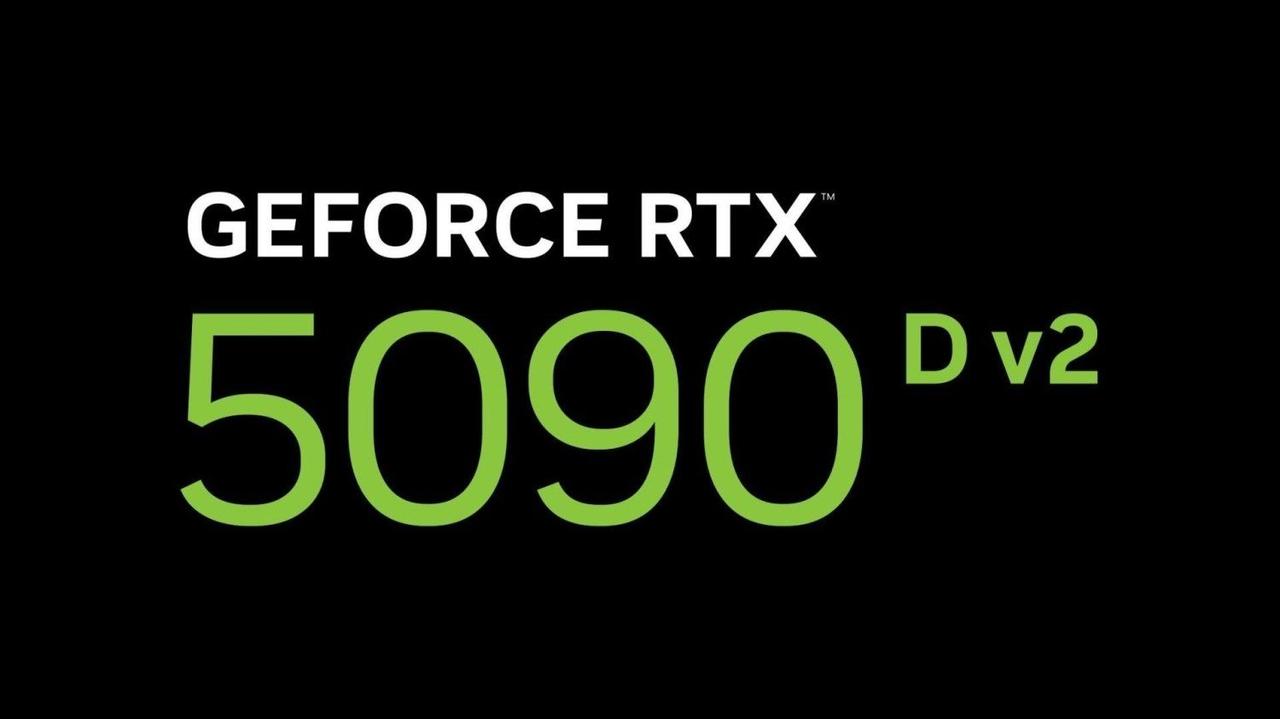NVIDIA's RTX 5090D for China: AI and Crypto-Mining Restrictions Spark Controversy
3 Sources
3 Sources
[1]
NVIDIA's new GeForce RTX 5090D for China has restricted AI, crypto-mining perforrmance
TL;DR: NVIDIA's GeForce RTX 5090D, exclusive to China, will have restrictions on AI and cryptomining performance, with automatic throttling after three seconds of sustained workload. It will not support multi-GPU configurations, affecting both Windows and Linux systems, making it unsuitable for professional workloads and AI clusters. NVIDIA's upcoming made-for-China exclusive GeForce RTX 5090D graphics card will have new restrictions in place over the RTX 4090D: stopping AI performance, and gimping cryptomining performance. The new NVIDIA GeForce RTX 5090D has been discussed on the Chiphell forums, with a "performance cut-off" in AI and crypto-related applications, where after 3 seconds of sustained workload the GPU will automatically lock its performance (through GPU clock speed reduction or throttling performance through on-board software). The power limits of the RTX 5090D are most likely going to be restricted, making the RTX 5090D a dud for professional workloads. NVIDIA's new GeForce RTX 5090D will also be blocked from any multi-GPU configurations, meaning adding multiple RTX 5090D cards to a system won't yield any performance benefits, unlike the RTX 4090D which could be stacked. There will be no AI clusters of RTX 5090D cards running on China -- and that's for Windows -- with Linux also affected, so there's no multi-GPU RTX 5090D setups possible on any operating system. The post on Chiphell explained: "AI is a real man in 3 seconds, and it locks the computing power in 3 seconds for alchemy, and the power consumption is locked, and you are not allowed to pull it online. The default is what it is (not sure if 5090D is like this or 5090 is also like this). Video editing, games, AI repair and the like have no effect". The post continues, adding: "to put it bluntly, those who buy 4090 as turbo cards will not work on 5090D. NVIDIA has completely blocked this multi-card operation, including the bottom layer of the Linux (operating) system. Good news RTX 5090D is not out of stock after the New Year, bad news RTX 5090 is soaring. Because the main consumer group is not those of us who play games, but those who do AI computing, so in their eyes, 5090D is just a bunch of answers".
[2]
NVIDIA's GeForce RTX 5090D To Feature Restricted AI and Crypto-Mining Performance; New Limitations Now In Place
NVIDIA's "China-compliant" GeForce RTX 5090D is expected to face new restrictions this time, compromising AI and crypto-mining performance. Team Green has no plans to leave the Chinese consumer markets behind. Alongside the mainstream RTX 50 series, the firm plans to immediately launch the GeForce RTX 5090D, which will be a successor to the RTX 4090D. There were rumors that NVIDIA won't do much in terms of downgrading the specifications of the RTX 5090D, and previous leaks have indeed verified this claim, but new findings from Chiphell reveal that there are some differences, specifically in terms of AI and mining performance of the SKU. The first major difference lies in the "performance cut-off," specifically in AI and crypto-related applications. It is claimed that after three seconds of workload, the GPU will automatically lock its performance, which likely refers to reduced clock speeds or performance throttling through the onboard software. Yet again, similar to the RTX 4090D, the power limit changes are restricted as well, so for professional computing workloads, the GeForce RTX 5090D may cause troubles in providing optimal performance. Another interesting difference is that the GeForce RTX 5090D will be barred from being used in multi-GPU configurations, which means that users won't be able to stack multiple SKUs to squeeze out higher performance. This trend was on top with the GeForce RTX 4090D, where individuals would convert it into "blower-style" designs and then use them in AI clusters to get out performance equivalent to that of mainstream AI accelerators. Multi-GPU setups won't be possible with the RTX 5090D anymore, even on Linux, as NVIDIA has implemented extensive restrictions. For gamers, the new restrictions won't affect performance since they are entirely targeted towards AI and professional workloads. For a quick rundown on the specifications of the GeForce RTX 5090D, it features the GB202 GPU die with a total of 21,760 CUDA Cores, along with 32 GB of GDDR7 memory running at 28 Gbps, offering a total of 1792 GB/s bandwidth. We have already seen AIB models, such as those from GALAX, surface, indicating that the markets are ready.
[3]
China-tailored RTX 5090D has AI and cryptomining limiters -- multi-GPU config is also locked
Locking down the RTX 5090D skirts the limits of US export regulations. Nvidia's upcoming China-focused RTX 5090D is purportedly locked down, preventing users from using the Blackwell GPU for specific workloads. A user on the Chiphell forums reports that after "3 seconds," the RTX 5090D locks itself, preventing users from running particular workloads, overclocking the GPU, adjusting power limit parameters, and even using the GPU in multi-GPU setups. The RTX "D-series" (for Dragon) is a custom Nvidia GPU explicitly tailored to meet U.S. export regulations based on GPU performance. The previous generation RTX 4090 was too powerful to export to China legally. Hence, Nvidia had to roll out the RTX 4090D, slightly less potent than its vanilla counterpart, to meet regulations. The RTX 5090D is the sucessor to the RTX 4090D. Nvidia has had to repeat this same strategy with the RTX 5090, but for the RTX 5090D variant, it has changed how it executes that strategy. The previous-gen RTX 4090D featured a physical reduction in GPU specs compared to the vanilla RTX 4090, operating with 12.8% fewer CUDA cores, 5.9% less power (maximum power), and slightly different base clock speeds. The RTX 5090D flips things around, featuring the full specs of the vanilla RTX 5090, all the way down to the base and boost clocks. The only thing Nvidia changed was the AI performance of the RTX 5090D, which has been "magically" reduced by a significant 29%. We say magically because it remains a mystery how Nvidia is handicapping the RTX 5090D's AI performance. The performance drops from 3,352 AI TOPS to 2,375 AI TOPS. The Chiphell user's discovery reveals that Nvidia relies heavily on artificial driver and/or firmware limitations to keep the RTX 5090D's performance in check. For instance, the driver appears to lock the RTX 5090D's performance at a three-second hard limit when it detects AI inferencing or a crypto mining workload. Apparently, generative AI isn't affected. The RTX 5090D seems to have a non-modifiable power limit, preventing potential user exploitation. Therefore, you can't overclock it. In comparison, the RTX 4090D's power limit wasn't restricted, so users can unlock it to 600W and overclock it to regain the lost performance. The Chiphell user was explicit that the RTX 5090D cannot be tweaked or manipulated online (or from the cloud) and cannot operate in a multi-GPU setup. Nvidia has purportedly locked this functionality down to the "bottom layer of the Linux system." The user neglected to share how the RTX 5090D behaves when another GPU is installed. Still, regardless, the RTX 5090D will apparently be unable to run any workloads in unison with another GPU, at the very least. Only time will tell whether Nvidia's limiters will work. Remember the LHR (Lite Hash Rate) fiasco during the great GPU shortage? The limiter was supposed to restrict the RTX 30-series GPU's mining performance to prevent cryptominers from gobbling up all the stock. It didn't take long for individuals and organizations to find a workaround.
Share
Share
Copy Link
NVIDIA's new GeForce RTX 5090D, designed exclusively for the Chinese market, comes with significant restrictions on AI and crypto-mining performance, raising questions about its utility for professional workloads.

NVIDIA Introduces RTX 5090D with Unique Restrictions
NVIDIA is set to launch the GeForce RTX 5090D, a graphics card exclusively designed for the Chinese market. This new offering comes with significant restrictions on AI and crypto-mining performance, marking a departure from its predecessor, the RTX 4090D
1
2
.Performance Limitations and Technical Specifications
The RTX 5090D boasts impressive specifications, including 21,760 CUDA Cores and 32 GB of GDDR7 memory running at 28 Gbps, providing a total bandwidth of 1792 GB/s
2
. However, the card's AI performance has been reduced from 3,352 AI TOPS to 2,375 AI TOPS, a substantial 29% decrease3
.Artificial Intelligence and Crypto-Mining Restrictions
A key feature of the RTX 5090D is its "performance cut-off" mechanism. After three seconds of sustained AI or crypto-related workload, the GPU automatically locks its performance through reduced clock speeds or software-based throttling
1
2
. This limitation significantly impacts the card's utility for professional AI and crypto-mining applications.Power and Multi-GPU Limitations
Unlike its predecessor, the RTX 5090D has restricted power limits, making it less suitable for professional workloads that require high performance
1
. Additionally, NVIDIA has implemented a complete block on multi-GPU configurations, preventing users from stacking multiple RTX 5090D cards for increased performance2
3
.Operating System Restrictions
The limitations extend across both Windows and Linux operating systems, effectively preventing the creation of AI clusters using RTX 5090D cards in China
1
3
. This restriction is implemented at the lowest levels of the Linux system, ensuring comprehensive enforcement3
.Related Stories
Market Implications and Consumer Impact
While these restrictions are unlikely to affect gaming performance, they significantly impact the card's utility for AI computing and professional workloads
2
. This move by NVIDIA appears to be a strategic decision to comply with U.S. export regulations while maintaining a presence in the Chinese consumer market2
3
.Potential for Workarounds
Despite NVIDIA's efforts to limit certain functionalities, historical precedents such as the LHR (Lite Hash Rate) limiter on RTX 30-series GPUs suggest that determined users might eventually find ways to circumvent these restrictions
3
. The effectiveness of these new limitations remains to be seen as the product enters the market.Conclusion
The introduction of the RTX 5090D with these unique restrictions highlights the complex interplay between technological advancement, market demands, and international regulations in the GPU industry. As the product launches, its reception and performance in real-world scenarios will be closely watched by industry observers and consumers alike.
References
Summarized by
Navi
Related Stories
NVIDIA Develops RTX 5090 DD: A New GPU Variant for China Amid Export Restrictions
19 Jun 2025•Technology

NVIDIA's GeForce RTX 5090 D V2: A New China-Specific GPU Launching in August
03 Jul 2025•Technology

NVIDIA Launches RTX 5090 D V2 in China: Gaming Performance Maintained, AI Capabilities Reduced
13 Aug 2025•Technology

Recent Highlights
1
ByteDance's Seedance 2.0 AI video generator triggers copyright infringement battle with Hollywood
Policy and Regulation

2
Demis Hassabis predicts AGI in 5-8 years, sees new golden era transforming medicine and science
Technology

3
Nvidia and Meta forge massive chip deal as computing power demands reshape AI infrastructure
Technology





